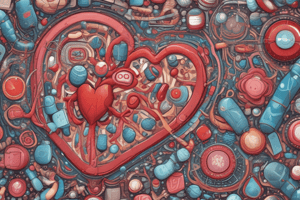Podcast
Questions and Answers
What is the mechanism of action of diuretics in reducing blood pressure?
What is the mechanism of action of diuretics in reducing blood pressure?
- Directly relaxing vascular smooth muscle
- Inhibiting the renin-angiotensin-aldosterone system
- Decreasing sodium reabsorption in the kidneys (correct)
- Increasing vasopressin levels
Which class of anti-hypertensive drugs is associated with increased risk of dry cough?
Which class of anti-hypertensive drugs is associated with increased risk of dry cough?
- Calcium channel blockers
- ACE inhibitors (correct)
- Alpha blockers
- Beta blockers
What is the primary effect of beta blockers on the cardiovascular system?
What is the primary effect of beta blockers on the cardiovascular system?
- Increasing vasopressin levels
- Increasing cardiac output
- Decreasing peripheral resistance
- Decreasing heart rate and contractility (correct)
Which anti-hypertensive drug class is commonly used in patients with heart failure?
Which anti-hypertensive drug class is commonly used in patients with heart failure?
What is the primary mechanism of action of calcium channel blockers?
What is the primary mechanism of action of calcium channel blockers?
Which class of anti-hypertensive drugs works by decreasing peripheral resistance?
Which class of anti-hypertensive drugs works by decreasing peripheral resistance?
Which anti-hypertensive drug class is used to reduce the sympathetic outflow from the CNS?
Which anti-hypertensive drug class is used to reduce the sympathetic outflow from the CNS?
Which of the following anti-hypertensive drugs is not a type of vasodilator?
Which of the following anti-hypertensive drugs is not a type of vasodilator?
Which class of anti-hypertensive drugs is used to reduce the amount of fluid in the blood vessels?
Which class of anti-hypertensive drugs is used to reduce the amount of fluid in the blood vessels?
Which of the following anti-hypertensive drugs is used to block the action of the hormone aldosterone?
Which of the following anti-hypertensive drugs is used to block the action of the hormone aldosterone?
Which class of anti-hypertensive drugs works by reducing the blood volume?
Which class of anti-hypertensive drugs works by reducing the blood volume?
Which of the following anti-hypertensive drugs is used to decrease the heart rate?
Which of the following anti-hypertensive drugs is used to decrease the heart rate?
Which class of anti-hypertensive drugs directly relaxes the smooth muscle in blood vessels?
Which class of anti-hypertensive drugs directly relaxes the smooth muscle in blood vessels?
Which anti-hypertensive drug class is used to counteract the effects of the sympathetic nervous system?
Which anti-hypertensive drug class is used to counteract the effects of the sympathetic nervous system?
Which class of anti-hypertensive drugs is used to reduce the constriction of blood vessels?
Which class of anti-hypertensive drugs is used to reduce the constriction of blood vessels?
Flashcards are hidden until you start studying
Study Notes
Diuretics and Blood Pressure
- Diuretics reduce blood pressure by increasing urine production, which decreases blood volume and cardiac output, ultimately leading to a decrease in blood pressure.
Anti-Hypertensive Drugs and Side Effects
- ACE inhibitors are associated with an increased risk of dry cough as a side effect.
Beta Blockers and the Cardiovascular System
- The primary effect of beta blockers on the cardiovascular system is to decrease heart rate and contractility, which reduces cardiac output and subsequently decreases blood pressure.
Treatment of Heart Failure
- ACE inhibitors, beta blockers, and spironolactone are commonly used anti-hypertensive drug classes in patients with heart failure.
Calcium Channel Blockers
- The primary mechanism of action of calcium channel blockers is to relax blood vessels by blocking the entry of calcium into vascular smooth muscle cells, which leads to vasodilation and a decrease in blood pressure.
Diuretics
- Diuretics reduce blood pressure by increasing urine production, which decreases blood volume and subsequently reduces blood pressure.
ACE Inhibitors
- ACE inhibitors are associated with an increased risk of dry cough as a side effect.
Beta Blockers
- Beta blockers primarily reduce the cardiovascular workload by slowing down the heart rate and reducing cardiac output, thereby lowering blood pressure.
Heart Failure Treatment
- ACE inhibitors are commonly used in patients with heart failure to reduce the workload on the heart and improve cardiac function.
Calcium Channel Blockers
- Calcium channel blockers primarily lower blood pressure by blocking the entry of calcium into vascular smooth muscle cells, which causes blood vessels to dilate and reduce peripheral resistance.
Vasodilators
- Vasodilators work by directly relaxing blood vessels, which decreases peripheral resistance and lowers blood pressure.
- Examples of vasodilators include calcium channel blockers, ACE inhibitors, and alpha-blockers.
Central-Acting Anti-Hypertensives
- Central-acting anti-hypertensives, such as methyldopa, work by reducing sympathetic outflow from the CNS, which leads to a decrease in blood pressure.
Non-Vasodilator Anti-Hypertensives
- Diuretics are an example of anti-hypertensive drugs that do not work by vasodilation.
Anti-Hypertensives Reducing Blood Volume
- Diuretics reduce blood pressure by decreasing the amount of fluid in the blood vessels, which lowers blood pressure.
Aldosterone Antagonists
- Spironolactone is an anti-hypertensive drug that works by blocking the action of the hormone aldosterone, which helps regulate electrolyte balance and blood pressure.
Studying That Suits You
Use AI to generate personalized quizzes and flashcards to suit your learning preferences.




